Organizational Best Practice in the Aviation Industry
VerifiedAdded on 2023/06/12
|12
|2604
|278
AI Summary
This article discusses the impact of technology, environmental issues, and customer experience on the aviation industry, with a focus on Qantas airlines. It suggests strategies for Qantas to adapt to these changes and stay competitive.
Contribute Materials
Your contribution can guide someone’s learning journey. Share your
documents today.
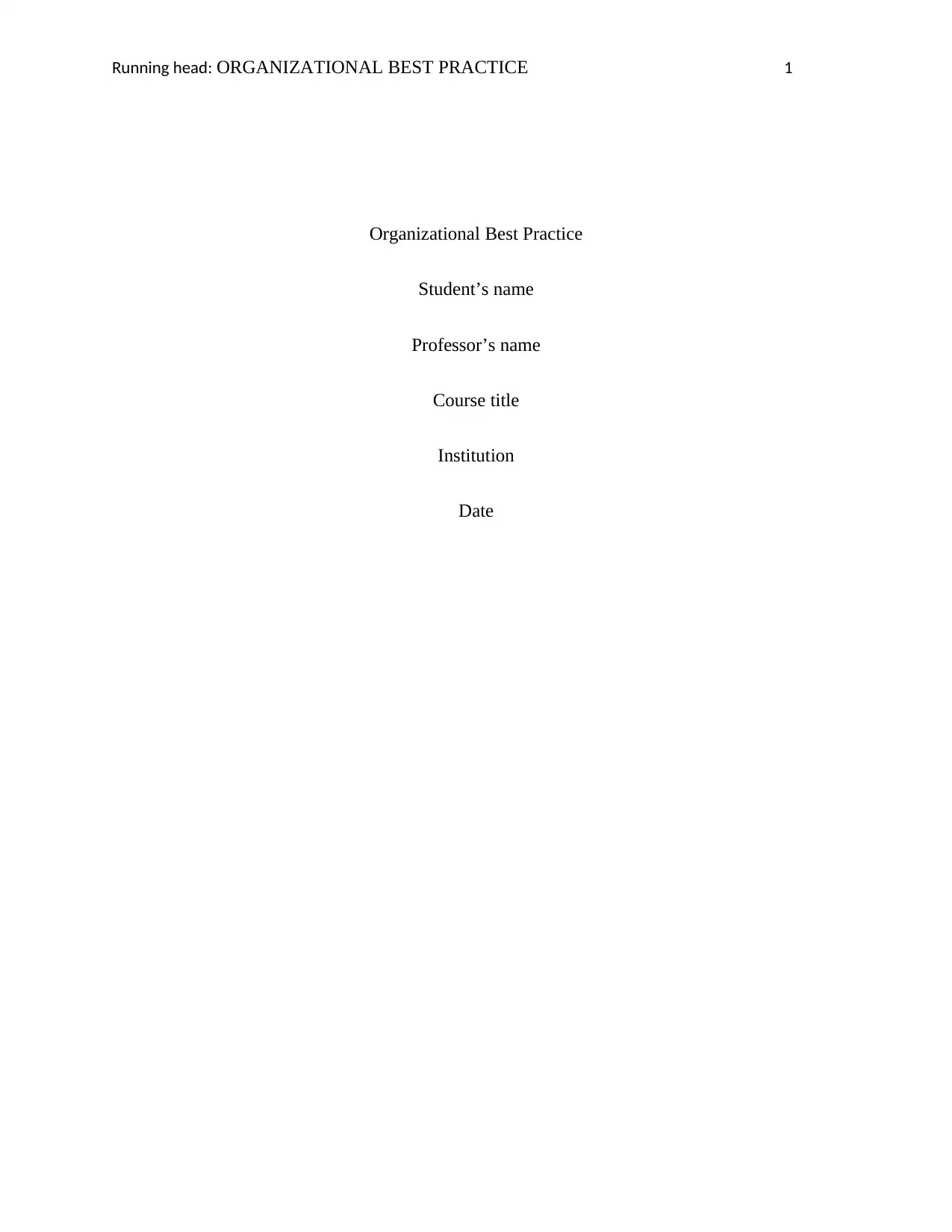
Running head: ORGANIZATIONAL BEST PRACTICE 1
Organizational Best Practice
Student’s name
Professor’s name
Course title
Institution
Date
Organizational Best Practice
Student’s name
Professor’s name
Course title
Institution
Date
Secure Best Marks with AI Grader
Need help grading? Try our AI Grader for instant feedback on your assignments.
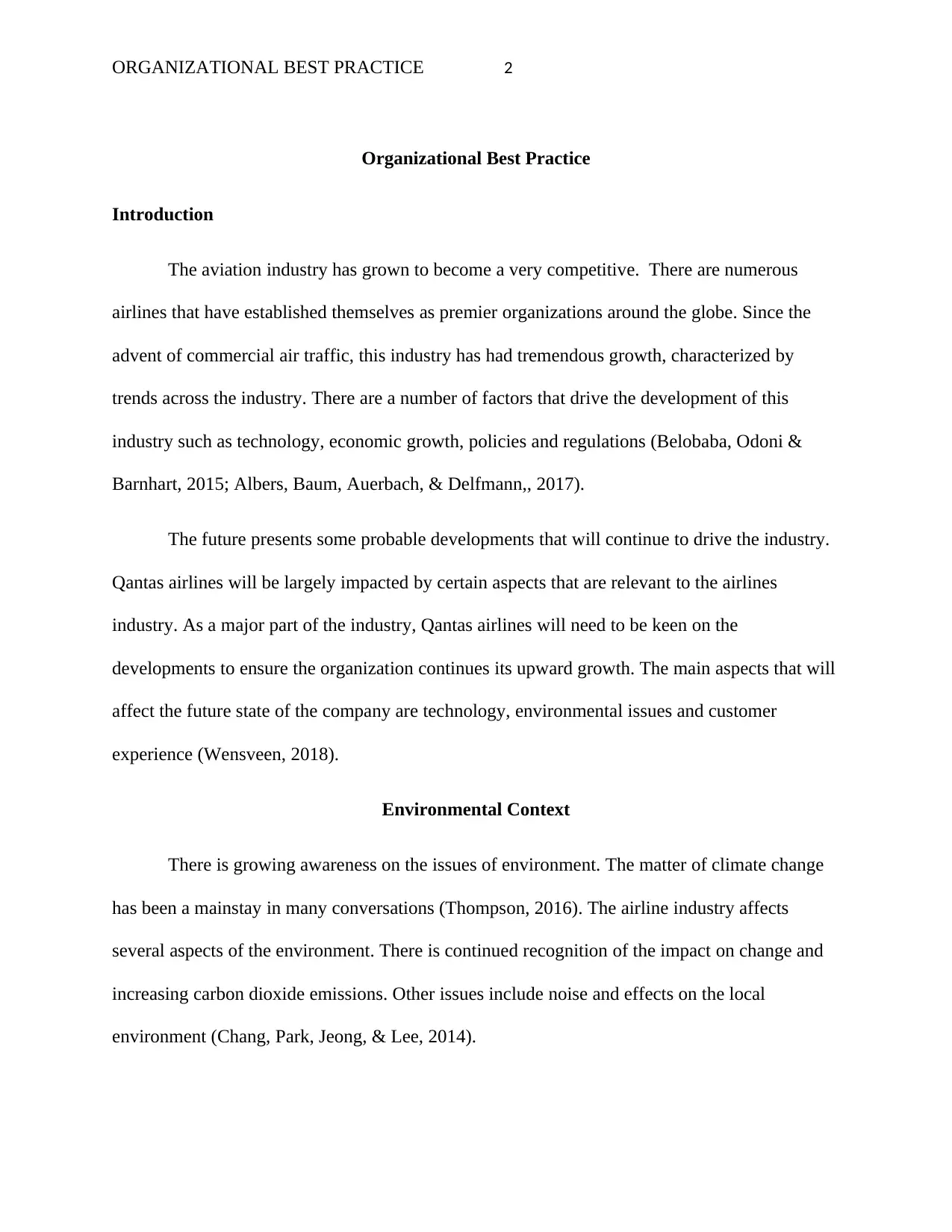
ORGANIZATIONAL BEST PRACTICE 2
Organizational Best Practice
Introduction
The aviation industry has grown to become a very competitive. There are numerous
airlines that have established themselves as premier organizations around the globe. Since the
advent of commercial air traffic, this industry has had tremendous growth, characterized by
trends across the industry. There are a number of factors that drive the development of this
industry such as technology, economic growth, policies and regulations (Belobaba, Odoni &
Barnhart, 2015; Albers, Baum, Auerbach, & Delfmann,, 2017).
The future presents some probable developments that will continue to drive the industry.
Qantas airlines will be largely impacted by certain aspects that are relevant to the airlines
industry. As a major part of the industry, Qantas airlines will need to be keen on the
developments to ensure the organization continues its upward growth. The main aspects that will
affect the future state of the company are technology, environmental issues and customer
experience (Wensveen, 2018).
Environmental Context
There is growing awareness on the issues of environment. The matter of climate change
has been a mainstay in many conversations (Thompson, 2016). The airline industry affects
several aspects of the environment. There is continued recognition of the impact on change and
increasing carbon dioxide emissions. Other issues include noise and effects on the local
environment (Chang, Park, Jeong, & Lee, 2014).
Organizational Best Practice
Introduction
The aviation industry has grown to become a very competitive. There are numerous
airlines that have established themselves as premier organizations around the globe. Since the
advent of commercial air traffic, this industry has had tremendous growth, characterized by
trends across the industry. There are a number of factors that drive the development of this
industry such as technology, economic growth, policies and regulations (Belobaba, Odoni &
Barnhart, 2015; Albers, Baum, Auerbach, & Delfmann,, 2017).
The future presents some probable developments that will continue to drive the industry.
Qantas airlines will be largely impacted by certain aspects that are relevant to the airlines
industry. As a major part of the industry, Qantas airlines will need to be keen on the
developments to ensure the organization continues its upward growth. The main aspects that will
affect the future state of the company are technology, environmental issues and customer
experience (Wensveen, 2018).
Environmental Context
There is growing awareness on the issues of environment. The matter of climate change
has been a mainstay in many conversations (Thompson, 2016). The airline industry affects
several aspects of the environment. There is continued recognition of the impact on change and
increasing carbon dioxide emissions. Other issues include noise and effects on the local
environment (Chang, Park, Jeong, & Lee, 2014).
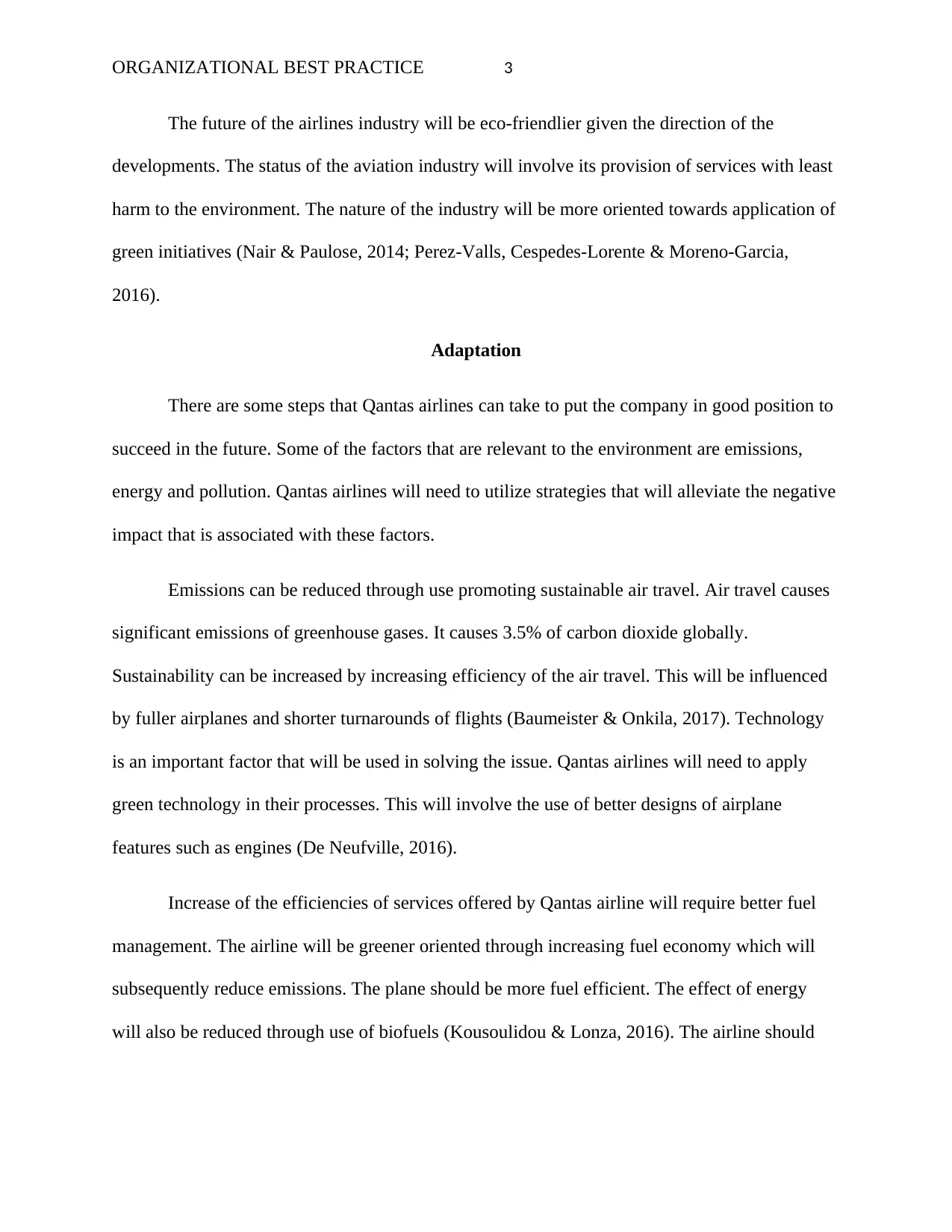
ORGANIZATIONAL BEST PRACTICE 3
The future of the airlines industry will be eco-friendlier given the direction of the
developments. The status of the aviation industry will involve its provision of services with least
harm to the environment. The nature of the industry will be more oriented towards application of
green initiatives (Nair & Paulose, 2014; Perez‐Valls, Cespedes‐Lorente & Moreno‐Garcia,
2016).
Adaptation
There are some steps that Qantas airlines can take to put the company in good position to
succeed in the future. Some of the factors that are relevant to the environment are emissions,
energy and pollution. Qantas airlines will need to utilize strategies that will alleviate the negative
impact that is associated with these factors.
Emissions can be reduced through use promoting sustainable air travel. Air travel causes
significant emissions of greenhouse gases. It causes 3.5% of carbon dioxide globally.
Sustainability can be increased by increasing efficiency of the air travel. This will be influenced
by fuller airplanes and shorter turnarounds of flights (Baumeister & Onkila, 2017). Technology
is an important factor that will be used in solving the issue. Qantas airlines will need to apply
green technology in their processes. This will involve the use of better designs of airplane
features such as engines (De Neufville, 2016).
Increase of the efficiencies of services offered by Qantas airline will require better fuel
management. The airline will be greener oriented through increasing fuel economy which will
subsequently reduce emissions. The plane should be more fuel efficient. The effect of energy
will also be reduced through use of biofuels (Kousoulidou & Lonza, 2016). The airline should
The future of the airlines industry will be eco-friendlier given the direction of the
developments. The status of the aviation industry will involve its provision of services with least
harm to the environment. The nature of the industry will be more oriented towards application of
green initiatives (Nair & Paulose, 2014; Perez‐Valls, Cespedes‐Lorente & Moreno‐Garcia,
2016).
Adaptation
There are some steps that Qantas airlines can take to put the company in good position to
succeed in the future. Some of the factors that are relevant to the environment are emissions,
energy and pollution. Qantas airlines will need to utilize strategies that will alleviate the negative
impact that is associated with these factors.
Emissions can be reduced through use promoting sustainable air travel. Air travel causes
significant emissions of greenhouse gases. It causes 3.5% of carbon dioxide globally.
Sustainability can be increased by increasing efficiency of the air travel. This will be influenced
by fuller airplanes and shorter turnarounds of flights (Baumeister & Onkila, 2017). Technology
is an important factor that will be used in solving the issue. Qantas airlines will need to apply
green technology in their processes. This will involve the use of better designs of airplane
features such as engines (De Neufville, 2016).
Increase of the efficiencies of services offered by Qantas airline will require better fuel
management. The airline will be greener oriented through increasing fuel economy which will
subsequently reduce emissions. The plane should be more fuel efficient. The effect of energy
will also be reduced through use of biofuels (Kousoulidou & Lonza, 2016). The airline should
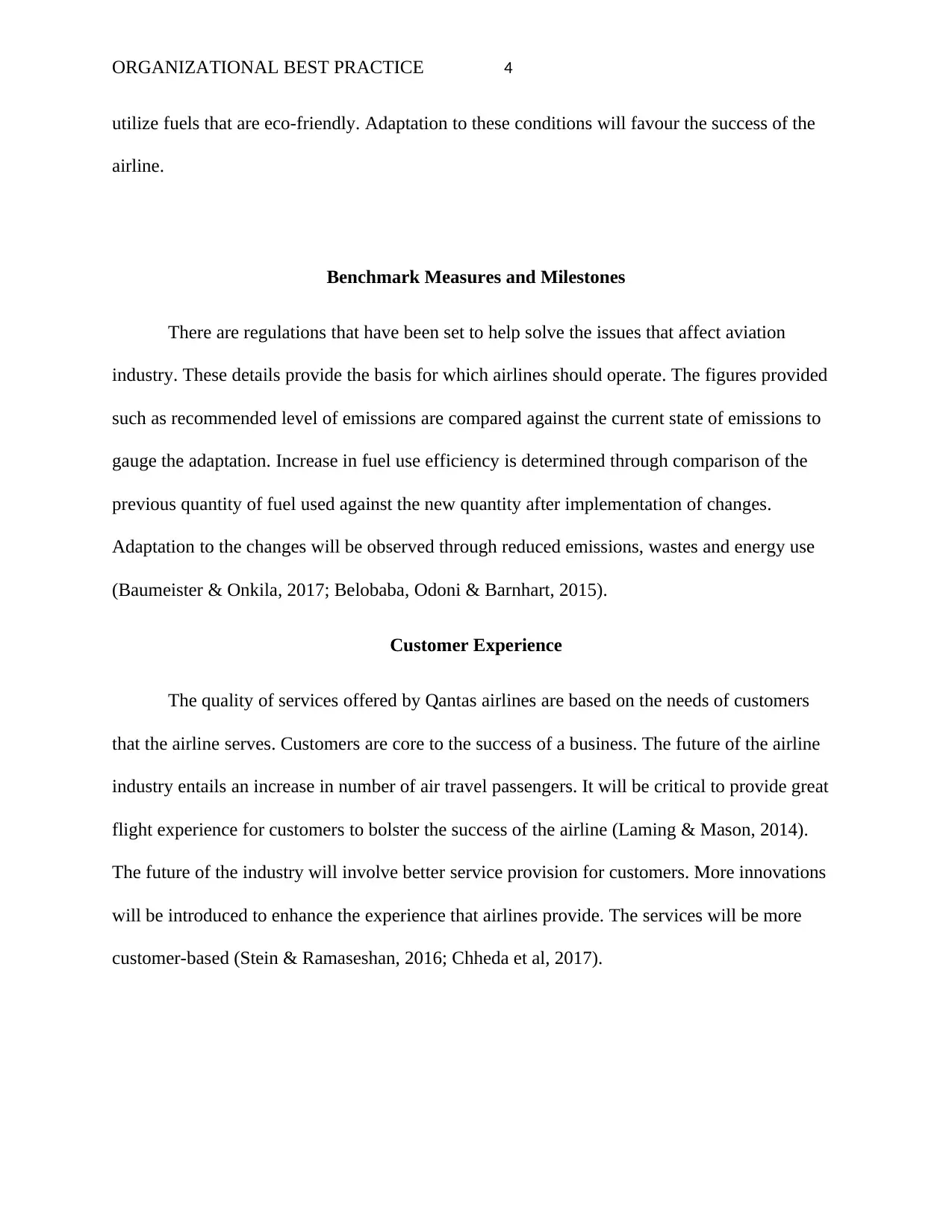
ORGANIZATIONAL BEST PRACTICE 4
utilize fuels that are eco-friendly. Adaptation to these conditions will favour the success of the
airline.
Benchmark Measures and Milestones
There are regulations that have been set to help solve the issues that affect aviation
industry. These details provide the basis for which airlines should operate. The figures provided
such as recommended level of emissions are compared against the current state of emissions to
gauge the adaptation. Increase in fuel use efficiency is determined through comparison of the
previous quantity of fuel used against the new quantity after implementation of changes.
Adaptation to the changes will be observed through reduced emissions, wastes and energy use
(Baumeister & Onkila, 2017; Belobaba, Odoni & Barnhart, 2015).
Customer Experience
The quality of services offered by Qantas airlines are based on the needs of customers
that the airline serves. Customers are core to the success of a business. The future of the airline
industry entails an increase in number of air travel passengers. It will be critical to provide great
flight experience for customers to bolster the success of the airline (Laming & Mason, 2014).
The future of the industry will involve better service provision for customers. More innovations
will be introduced to enhance the experience that airlines provide. The services will be more
customer-based (Stein & Ramaseshan, 2016; Chheda et al, 2017).
utilize fuels that are eco-friendly. Adaptation to these conditions will favour the success of the
airline.
Benchmark Measures and Milestones
There are regulations that have been set to help solve the issues that affect aviation
industry. These details provide the basis for which airlines should operate. The figures provided
such as recommended level of emissions are compared against the current state of emissions to
gauge the adaptation. Increase in fuel use efficiency is determined through comparison of the
previous quantity of fuel used against the new quantity after implementation of changes.
Adaptation to the changes will be observed through reduced emissions, wastes and energy use
(Baumeister & Onkila, 2017; Belobaba, Odoni & Barnhart, 2015).
Customer Experience
The quality of services offered by Qantas airlines are based on the needs of customers
that the airline serves. Customers are core to the success of a business. The future of the airline
industry entails an increase in number of air travel passengers. It will be critical to provide great
flight experience for customers to bolster the success of the airline (Laming & Mason, 2014).
The future of the industry will involve better service provision for customers. More innovations
will be introduced to enhance the experience that airlines provide. The services will be more
customer-based (Stein & Ramaseshan, 2016; Chheda et al, 2017).
Secure Best Marks with AI Grader
Need help grading? Try our AI Grader for instant feedback on your assignments.
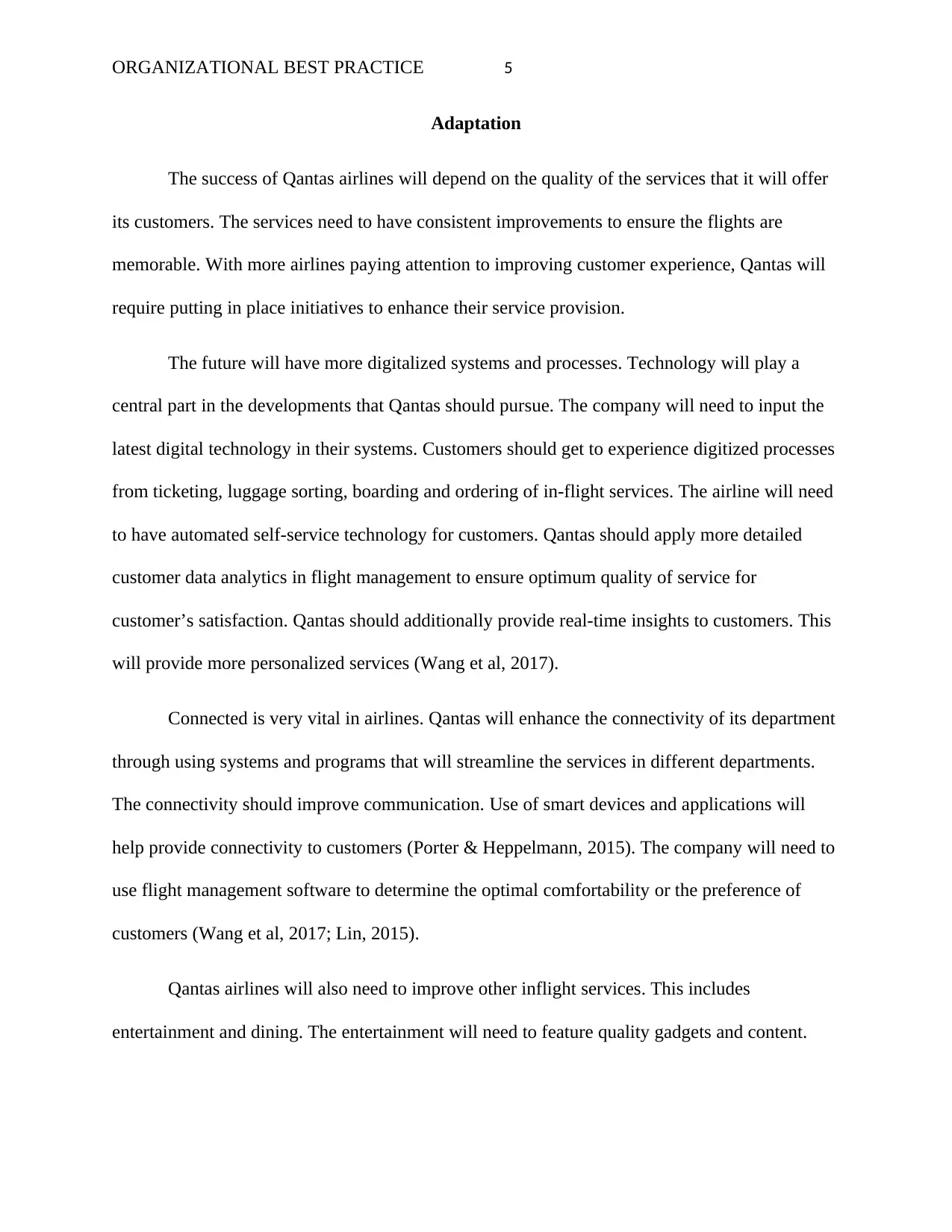
ORGANIZATIONAL BEST PRACTICE 5
Adaptation
The success of Qantas airlines will depend on the quality of the services that it will offer
its customers. The services need to have consistent improvements to ensure the flights are
memorable. With more airlines paying attention to improving customer experience, Qantas will
require putting in place initiatives to enhance their service provision.
The future will have more digitalized systems and processes. Technology will play a
central part in the developments that Qantas should pursue. The company will need to input the
latest digital technology in their systems. Customers should get to experience digitized processes
from ticketing, luggage sorting, boarding and ordering of in-flight services. The airline will need
to have automated self-service technology for customers. Qantas should apply more detailed
customer data analytics in flight management to ensure optimum quality of service for
customer’s satisfaction. Qantas should additionally provide real-time insights to customers. This
will provide more personalized services (Wang et al, 2017).
Connected is very vital in airlines. Qantas will enhance the connectivity of its department
through using systems and programs that will streamline the services in different departments.
The connectivity should improve communication. Use of smart devices and applications will
help provide connectivity to customers (Porter & Heppelmann, 2015). The company will need to
use flight management software to determine the optimal comfortability or the preference of
customers (Wang et al, 2017; Lin, 2015).
Qantas airlines will also need to improve other inflight services. This includes
entertainment and dining. The entertainment will need to feature quality gadgets and content.
Adaptation
The success of Qantas airlines will depend on the quality of the services that it will offer
its customers. The services need to have consistent improvements to ensure the flights are
memorable. With more airlines paying attention to improving customer experience, Qantas will
require putting in place initiatives to enhance their service provision.
The future will have more digitalized systems and processes. Technology will play a
central part in the developments that Qantas should pursue. The company will need to input the
latest digital technology in their systems. Customers should get to experience digitized processes
from ticketing, luggage sorting, boarding and ordering of in-flight services. The airline will need
to have automated self-service technology for customers. Qantas should apply more detailed
customer data analytics in flight management to ensure optimum quality of service for
customer’s satisfaction. Qantas should additionally provide real-time insights to customers. This
will provide more personalized services (Wang et al, 2017).
Connected is very vital in airlines. Qantas will enhance the connectivity of its department
through using systems and programs that will streamline the services in different departments.
The connectivity should improve communication. Use of smart devices and applications will
help provide connectivity to customers (Porter & Heppelmann, 2015). The company will need to
use flight management software to determine the optimal comfortability or the preference of
customers (Wang et al, 2017; Lin, 2015).
Qantas airlines will also need to improve other inflight services. This includes
entertainment and dining. The entertainment will need to feature quality gadgets and content.
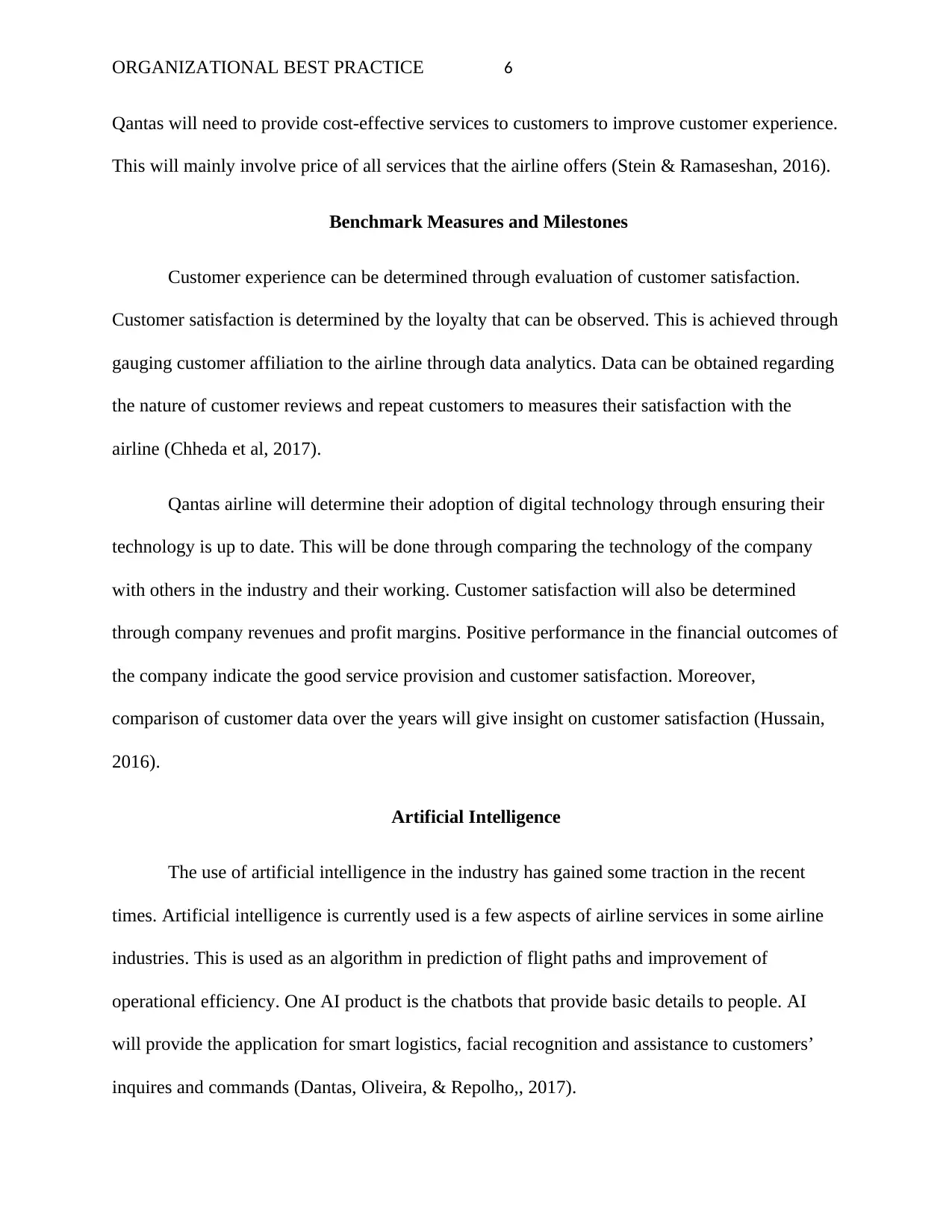
ORGANIZATIONAL BEST PRACTICE 6
Qantas will need to provide cost-effective services to customers to improve customer experience.
This will mainly involve price of all services that the airline offers (Stein & Ramaseshan, 2016).
Benchmark Measures and Milestones
Customer experience can be determined through evaluation of customer satisfaction.
Customer satisfaction is determined by the loyalty that can be observed. This is achieved through
gauging customer affiliation to the airline through data analytics. Data can be obtained regarding
the nature of customer reviews and repeat customers to measures their satisfaction with the
airline (Chheda et al, 2017).
Qantas airline will determine their adoption of digital technology through ensuring their
technology is up to date. This will be done through comparing the technology of the company
with others in the industry and their working. Customer satisfaction will also be determined
through company revenues and profit margins. Positive performance in the financial outcomes of
the company indicate the good service provision and customer satisfaction. Moreover,
comparison of customer data over the years will give insight on customer satisfaction (Hussain,
2016).
Artificial Intelligence
The use of artificial intelligence in the industry has gained some traction in the recent
times. Artificial intelligence is currently used is a few aspects of airline services in some airline
industries. This is used as an algorithm in prediction of flight paths and improvement of
operational efficiency. One AI product is the chatbots that provide basic details to people. AI
will provide the application for smart logistics, facial recognition and assistance to customers’
inquires and commands (Dantas, Oliveira, & Repolho,, 2017).
Qantas will need to provide cost-effective services to customers to improve customer experience.
This will mainly involve price of all services that the airline offers (Stein & Ramaseshan, 2016).
Benchmark Measures and Milestones
Customer experience can be determined through evaluation of customer satisfaction.
Customer satisfaction is determined by the loyalty that can be observed. This is achieved through
gauging customer affiliation to the airline through data analytics. Data can be obtained regarding
the nature of customer reviews and repeat customers to measures their satisfaction with the
airline (Chheda et al, 2017).
Qantas airline will determine their adoption of digital technology through ensuring their
technology is up to date. This will be done through comparing the technology of the company
with others in the industry and their working. Customer satisfaction will also be determined
through company revenues and profit margins. Positive performance in the financial outcomes of
the company indicate the good service provision and customer satisfaction. Moreover,
comparison of customer data over the years will give insight on customer satisfaction (Hussain,
2016).
Artificial Intelligence
The use of artificial intelligence in the industry has gained some traction in the recent
times. Artificial intelligence is currently used is a few aspects of airline services in some airline
industries. This is used as an algorithm in prediction of flight paths and improvement of
operational efficiency. One AI product is the chatbots that provide basic details to people. AI
will provide the application for smart logistics, facial recognition and assistance to customers’
inquires and commands (Dantas, Oliveira, & Repolho,, 2017).
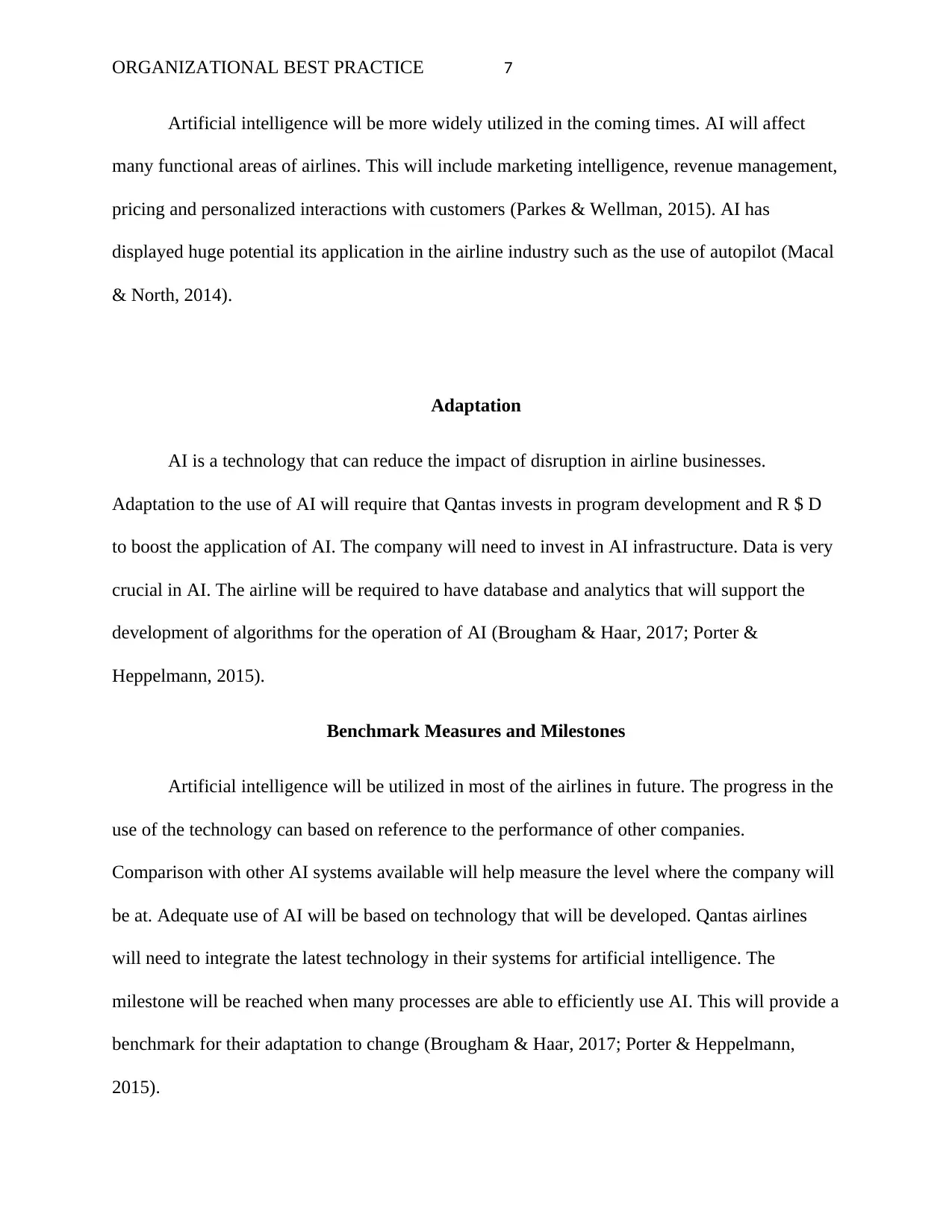
ORGANIZATIONAL BEST PRACTICE 7
Artificial intelligence will be more widely utilized in the coming times. AI will affect
many functional areas of airlines. This will include marketing intelligence, revenue management,
pricing and personalized interactions with customers (Parkes & Wellman, 2015). AI has
displayed huge potential its application in the airline industry such as the use of autopilot (Macal
& North, 2014).
Adaptation
AI is a technology that can reduce the impact of disruption in airline businesses.
Adaptation to the use of AI will require that Qantas invests in program development and R $ D
to boost the application of AI. The company will need to invest in AI infrastructure. Data is very
crucial in AI. The airline will be required to have database and analytics that will support the
development of algorithms for the operation of AI (Brougham & Haar, 2017; Porter &
Heppelmann, 2015).
Benchmark Measures and Milestones
Artificial intelligence will be utilized in most of the airlines in future. The progress in the
use of the technology can based on reference to the performance of other companies.
Comparison with other AI systems available will help measure the level where the company will
be at. Adequate use of AI will be based on technology that will be developed. Qantas airlines
will need to integrate the latest technology in their systems for artificial intelligence. The
milestone will be reached when many processes are able to efficiently use AI. This will provide a
benchmark for their adaptation to change (Brougham & Haar, 2017; Porter & Heppelmann,
2015).
Artificial intelligence will be more widely utilized in the coming times. AI will affect
many functional areas of airlines. This will include marketing intelligence, revenue management,
pricing and personalized interactions with customers (Parkes & Wellman, 2015). AI has
displayed huge potential its application in the airline industry such as the use of autopilot (Macal
& North, 2014).
Adaptation
AI is a technology that can reduce the impact of disruption in airline businesses.
Adaptation to the use of AI will require that Qantas invests in program development and R $ D
to boost the application of AI. The company will need to invest in AI infrastructure. Data is very
crucial in AI. The airline will be required to have database and analytics that will support the
development of algorithms for the operation of AI (Brougham & Haar, 2017; Porter &
Heppelmann, 2015).
Benchmark Measures and Milestones
Artificial intelligence will be utilized in most of the airlines in future. The progress in the
use of the technology can based on reference to the performance of other companies.
Comparison with other AI systems available will help measure the level where the company will
be at. Adequate use of AI will be based on technology that will be developed. Qantas airlines
will need to integrate the latest technology in their systems for artificial intelligence. The
milestone will be reached when many processes are able to efficiently use AI. This will provide a
benchmark for their adaptation to change (Brougham & Haar, 2017; Porter & Heppelmann,
2015).
Paraphrase This Document
Need a fresh take? Get an instant paraphrase of this document with our AI Paraphraser
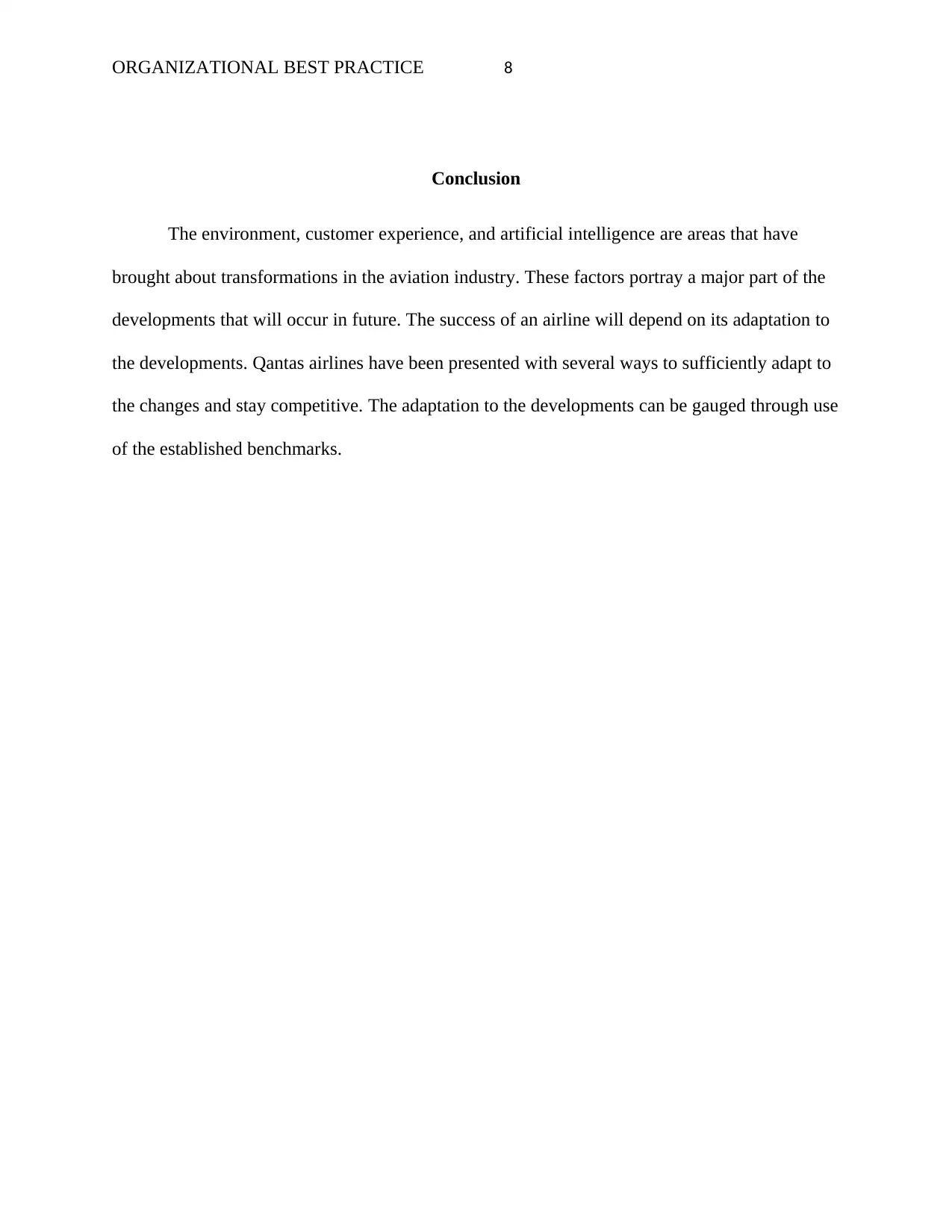
ORGANIZATIONAL BEST PRACTICE 8
Conclusion
The environment, customer experience, and artificial intelligence are areas that have
brought about transformations in the aviation industry. These factors portray a major part of the
developments that will occur in future. The success of an airline will depend on its adaptation to
the developments. Qantas airlines have been presented with several ways to sufficiently adapt to
the changes and stay competitive. The adaptation to the developments can be gauged through use
of the established benchmarks.
Conclusion
The environment, customer experience, and artificial intelligence are areas that have
brought about transformations in the aviation industry. These factors portray a major part of the
developments that will occur in future. The success of an airline will depend on its adaptation to
the developments. Qantas airlines have been presented with several ways to sufficiently adapt to
the changes and stay competitive. The adaptation to the developments can be gauged through use
of the established benchmarks.
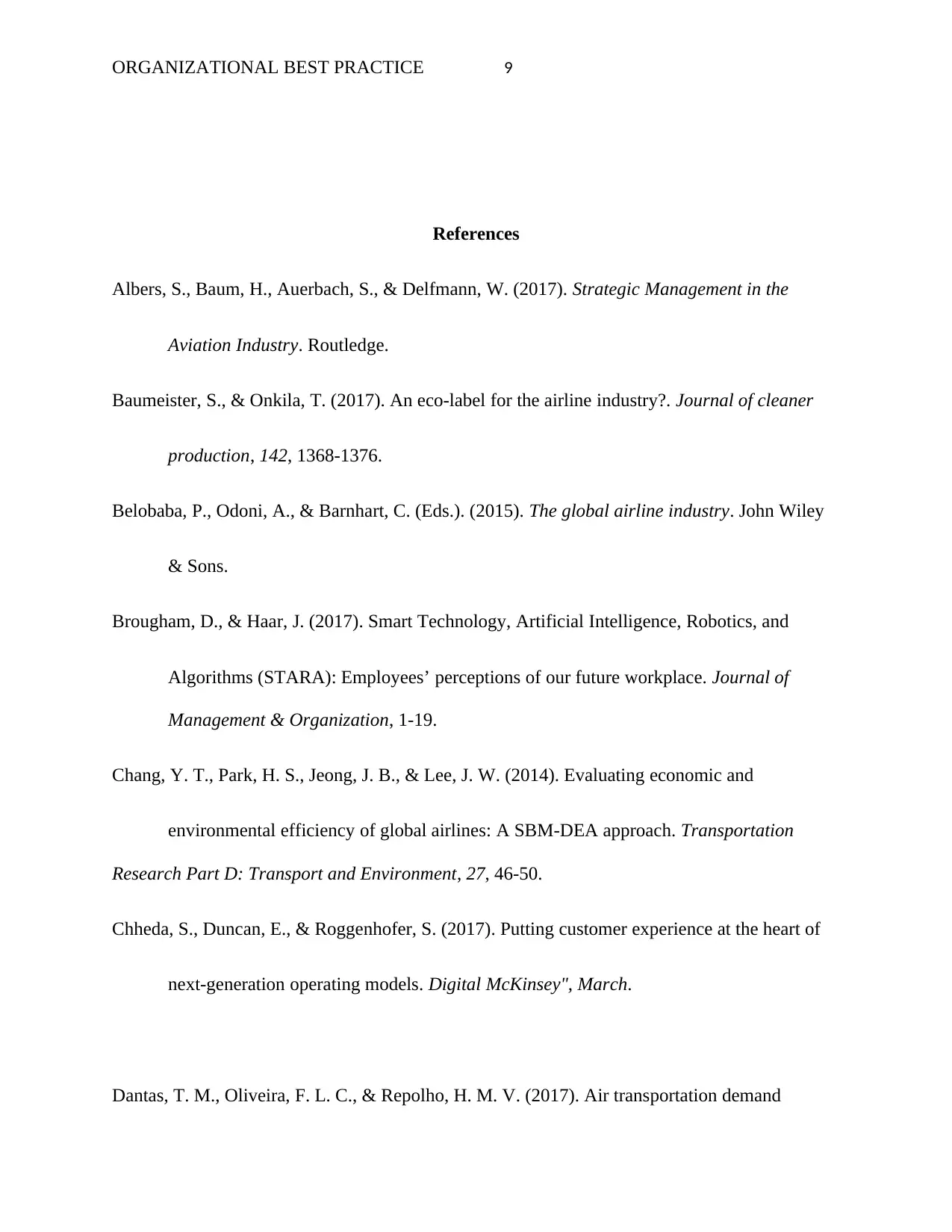
ORGANIZATIONAL BEST PRACTICE 9
References
Albers, S., Baum, H., Auerbach, S., & Delfmann, W. (2017). Strategic Management in the
Aviation Industry. Routledge.
Baumeister, S., & Onkila, T. (2017). An eco-label for the airline industry?. Journal of cleaner
production, 142, 1368-1376.
Belobaba, P., Odoni, A., & Barnhart, C. (Eds.). (2015). The global airline industry. John Wiley
& Sons.
Brougham, D., & Haar, J. (2017). Smart Technology, Artificial Intelligence, Robotics, and
Algorithms (STARA): Employees’ perceptions of our future workplace. Journal of
Management & Organization, 1-19.
Chang, Y. T., Park, H. S., Jeong, J. B., & Lee, J. W. (2014). Evaluating economic and
environmental efficiency of global airlines: A SBM-DEA approach. Transportation
Research Part D: Transport and Environment, 27, 46-50.
Chheda, S., Duncan, E., & Roggenhofer, S. (2017). Putting customer experience at the heart of
next-generation operating models. Digital McKinsey", March.
Dantas, T. M., Oliveira, F. L. C., & Repolho, H. M. V. (2017). Air transportation demand
References
Albers, S., Baum, H., Auerbach, S., & Delfmann, W. (2017). Strategic Management in the
Aviation Industry. Routledge.
Baumeister, S., & Onkila, T. (2017). An eco-label for the airline industry?. Journal of cleaner
production, 142, 1368-1376.
Belobaba, P., Odoni, A., & Barnhart, C. (Eds.). (2015). The global airline industry. John Wiley
& Sons.
Brougham, D., & Haar, J. (2017). Smart Technology, Artificial Intelligence, Robotics, and
Algorithms (STARA): Employees’ perceptions of our future workplace. Journal of
Management & Organization, 1-19.
Chang, Y. T., Park, H. S., Jeong, J. B., & Lee, J. W. (2014). Evaluating economic and
environmental efficiency of global airlines: A SBM-DEA approach. Transportation
Research Part D: Transport and Environment, 27, 46-50.
Chheda, S., Duncan, E., & Roggenhofer, S. (2017). Putting customer experience at the heart of
next-generation operating models. Digital McKinsey", March.
Dantas, T. M., Oliveira, F. L. C., & Repolho, H. M. V. (2017). Air transportation demand
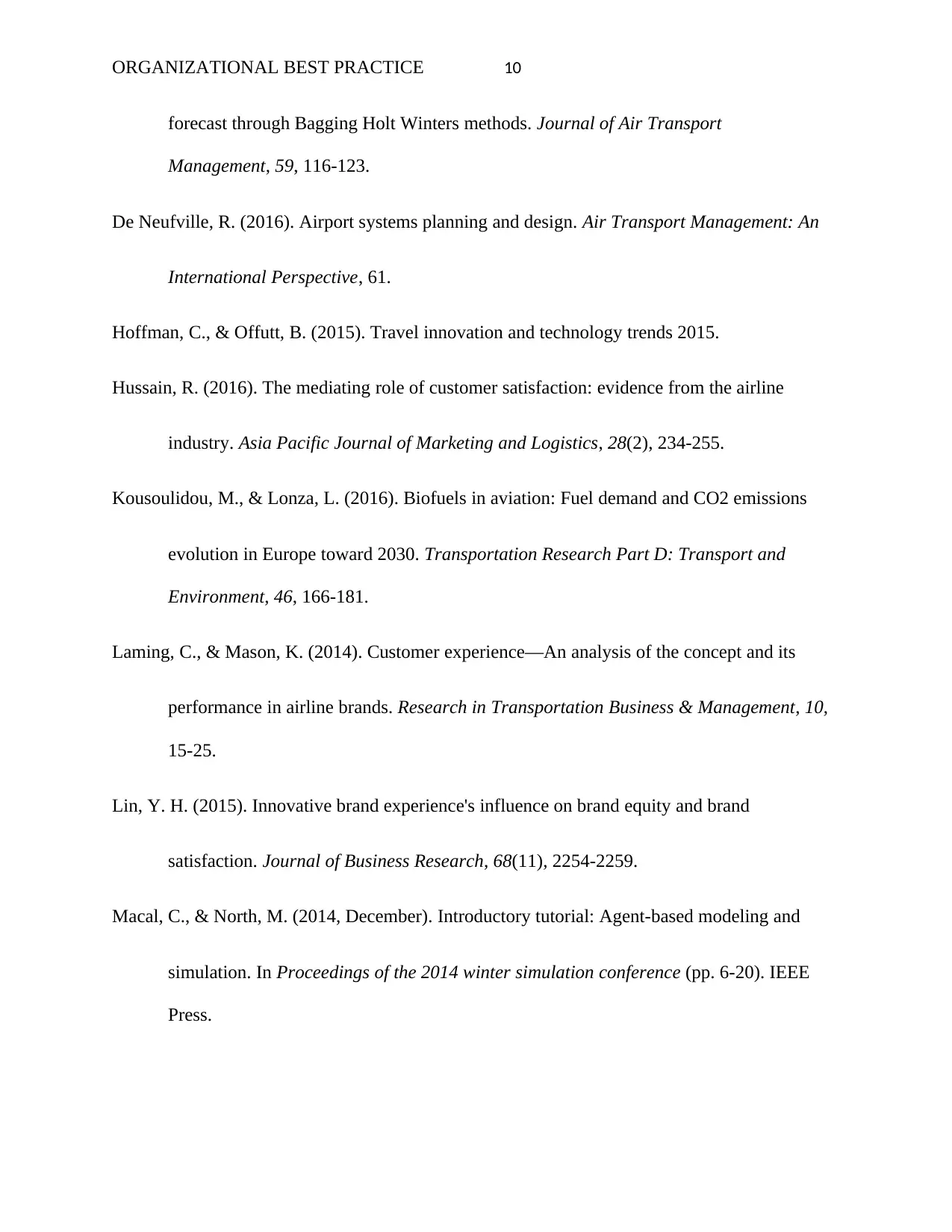
ORGANIZATIONAL BEST PRACTICE 10
forecast through Bagging Holt Winters methods. Journal of Air Transport
Management, 59, 116-123.
De Neufville, R. (2016). Airport systems planning and design. Air Transport Management: An
International Perspective, 61.
Hoffman, C., & Offutt, B. (2015). Travel innovation and technology trends 2015.
Hussain, R. (2016). The mediating role of customer satisfaction: evidence from the airline
industry. Asia Pacific Journal of Marketing and Logistics, 28(2), 234-255.
Kousoulidou, M., & Lonza, L. (2016). Biofuels in aviation: Fuel demand and CO2 emissions
evolution in Europe toward 2030. Transportation Research Part D: Transport and
Environment, 46, 166-181.
Laming, C., & Mason, K. (2014). Customer experience—An analysis of the concept and its
performance in airline brands. Research in Transportation Business & Management, 10,
15-25.
Lin, Y. H. (2015). Innovative brand experience's influence on brand equity and brand
satisfaction. Journal of Business Research, 68(11), 2254-2259.
Macal, C., & North, M. (2014, December). Introductory tutorial: Agent-based modeling and
simulation. In Proceedings of the 2014 winter simulation conference (pp. 6-20). IEEE
Press.
forecast through Bagging Holt Winters methods. Journal of Air Transport
Management, 59, 116-123.
De Neufville, R. (2016). Airport systems planning and design. Air Transport Management: An
International Perspective, 61.
Hoffman, C., & Offutt, B. (2015). Travel innovation and technology trends 2015.
Hussain, R. (2016). The mediating role of customer satisfaction: evidence from the airline
industry. Asia Pacific Journal of Marketing and Logistics, 28(2), 234-255.
Kousoulidou, M., & Lonza, L. (2016). Biofuels in aviation: Fuel demand and CO2 emissions
evolution in Europe toward 2030. Transportation Research Part D: Transport and
Environment, 46, 166-181.
Laming, C., & Mason, K. (2014). Customer experience—An analysis of the concept and its
performance in airline brands. Research in Transportation Business & Management, 10,
15-25.
Lin, Y. H. (2015). Innovative brand experience's influence on brand equity and brand
satisfaction. Journal of Business Research, 68(11), 2254-2259.
Macal, C., & North, M. (2014, December). Introductory tutorial: Agent-based modeling and
simulation. In Proceedings of the 2014 winter simulation conference (pp. 6-20). IEEE
Press.
Secure Best Marks with AI Grader
Need help grading? Try our AI Grader for instant feedback on your assignments.
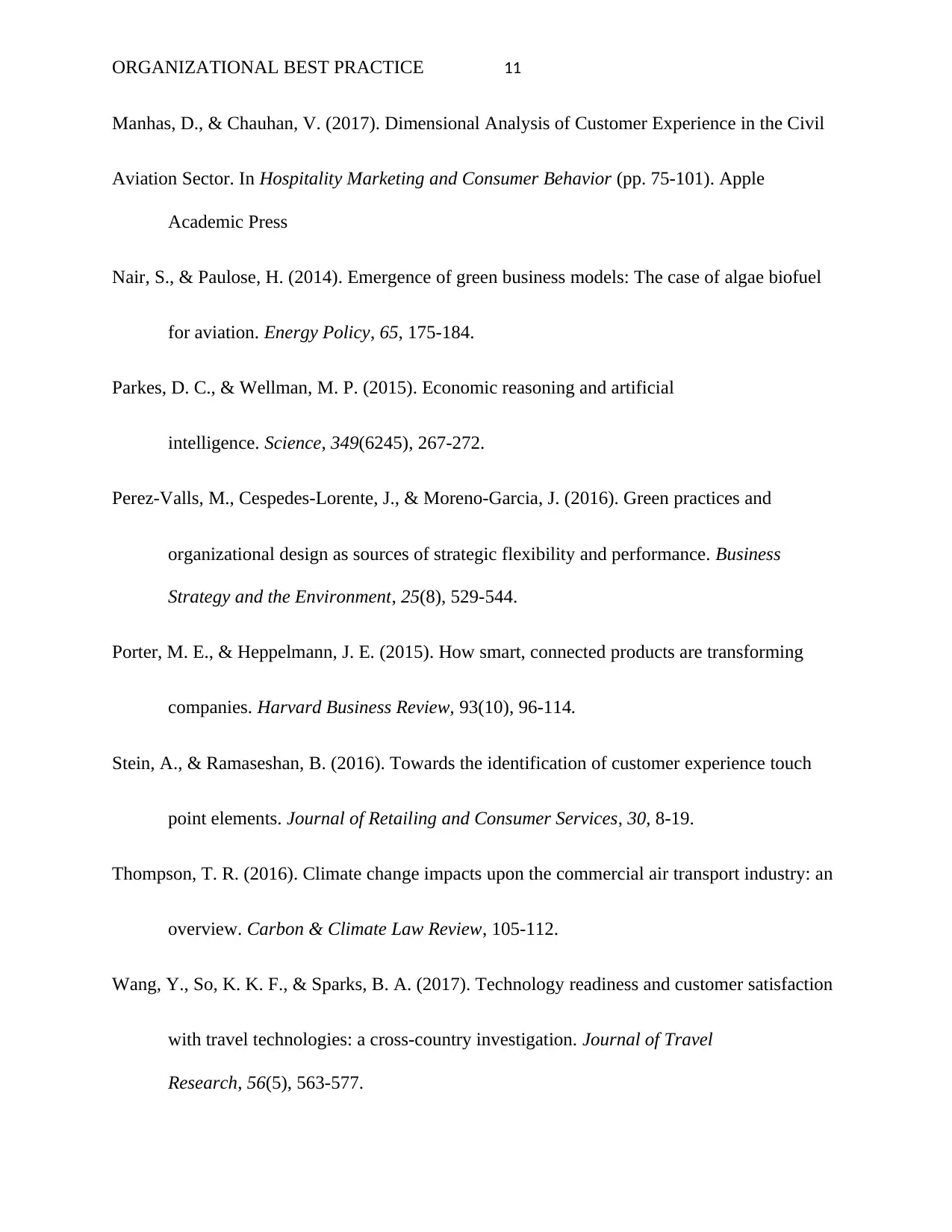
ORGANIZATIONAL BEST PRACTICE 11
Manhas, D., & Chauhan, V. (2017). Dimensional Analysis of Customer Experience in the Civil
Aviation Sector. In Hospitality Marketing and Consumer Behavior (pp. 75-101). Apple
Academic Press
Nair, S., & Paulose, H. (2014). Emergence of green business models: The case of algae biofuel
for aviation. Energy Policy, 65, 175-184.
Parkes, D. C., & Wellman, M. P. (2015). Economic reasoning and artificial
intelligence. Science, 349(6245), 267-272.
Perez‐Valls, M., Cespedes‐Lorente, J., & Moreno‐Garcia, J. (2016). Green practices and
organizational design as sources of strategic flexibility and performance. Business
Strategy and the Environment, 25(8), 529-544.
Porter, M. E., & Heppelmann, J. E. (2015). How smart, connected products are transforming
companies. Harvard Business Review, 93(10), 96-114.
Stein, A., & Ramaseshan, B. (2016). Towards the identification of customer experience touch
point elements. Journal of Retailing and Consumer Services, 30, 8-19.
Thompson, T. R. (2016). Climate change impacts upon the commercial air transport industry: an
overview. Carbon & Climate Law Review, 105-112.
Wang, Y., So, K. K. F., & Sparks, B. A. (2017). Technology readiness and customer satisfaction
with travel technologies: a cross-country investigation. Journal of Travel
Research, 56(5), 563-577.
Manhas, D., & Chauhan, V. (2017). Dimensional Analysis of Customer Experience in the Civil
Aviation Sector. In Hospitality Marketing and Consumer Behavior (pp. 75-101). Apple
Academic Press
Nair, S., & Paulose, H. (2014). Emergence of green business models: The case of algae biofuel
for aviation. Energy Policy, 65, 175-184.
Parkes, D. C., & Wellman, M. P. (2015). Economic reasoning and artificial
intelligence. Science, 349(6245), 267-272.
Perez‐Valls, M., Cespedes‐Lorente, J., & Moreno‐Garcia, J. (2016). Green practices and
organizational design as sources of strategic flexibility and performance. Business
Strategy and the Environment, 25(8), 529-544.
Porter, M. E., & Heppelmann, J. E. (2015). How smart, connected products are transforming
companies. Harvard Business Review, 93(10), 96-114.
Stein, A., & Ramaseshan, B. (2016). Towards the identification of customer experience touch
point elements. Journal of Retailing and Consumer Services, 30, 8-19.
Thompson, T. R. (2016). Climate change impacts upon the commercial air transport industry: an
overview. Carbon & Climate Law Review, 105-112.
Wang, Y., So, K. K. F., & Sparks, B. A. (2017). Technology readiness and customer satisfaction
with travel technologies: a cross-country investigation. Journal of Travel
Research, 56(5), 563-577.
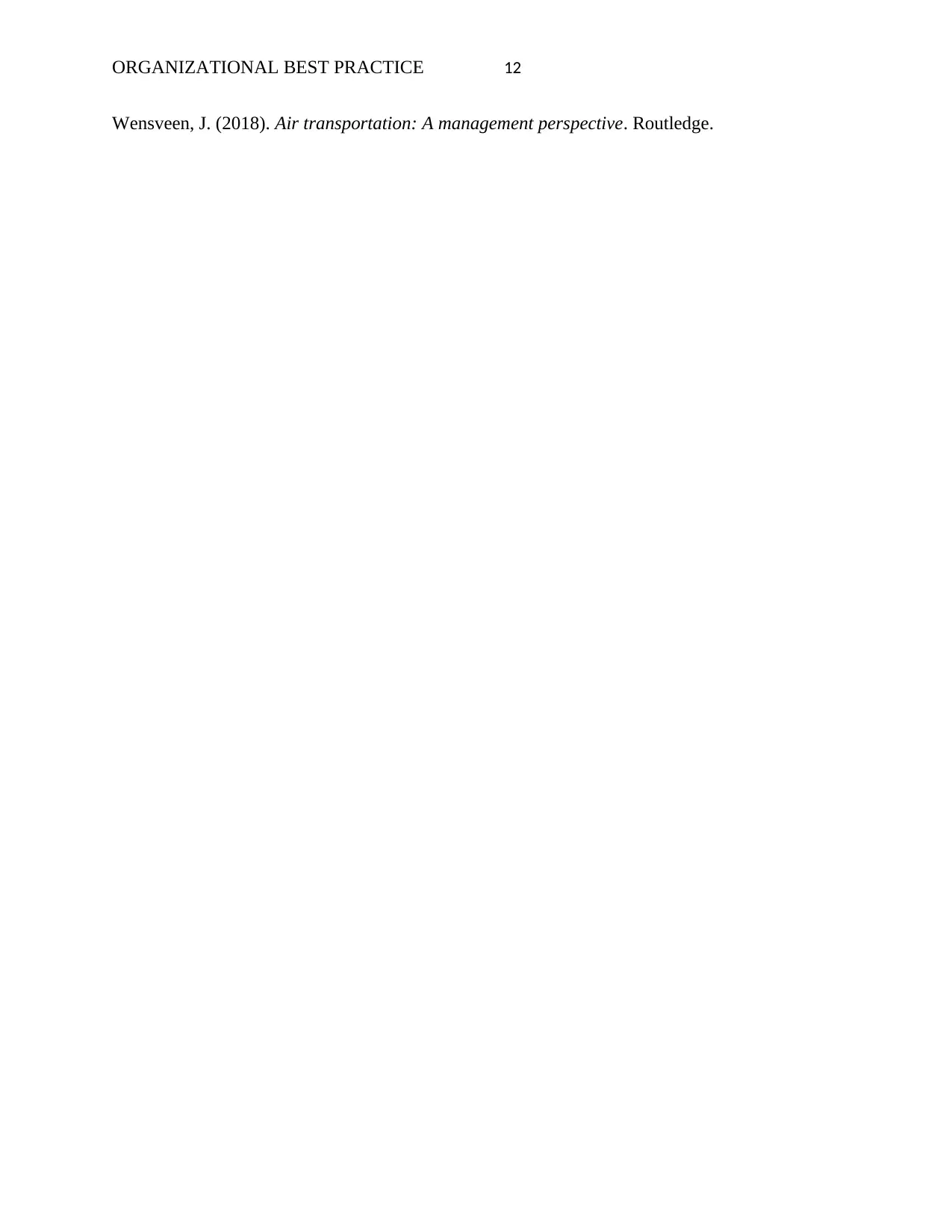
ORGANIZATIONAL BEST PRACTICE 12
Wensveen, J. (2018). Air transportation: A management perspective. Routledge.
Wensveen, J. (2018). Air transportation: A management perspective. Routledge.
1 out of 12
Related Documents
Your All-in-One AI-Powered Toolkit for Academic Success.
+13062052269
info@desklib.com
Available 24*7 on WhatsApp / Email
![[object Object]](/_next/static/media/star-bottom.7253800d.svg)
Unlock your academic potential
© 2024 | Zucol Services PVT LTD | All rights reserved.





